
The Acorn Electron was a lower-cost alternative to the BBC Micro educational/home computer, also developed by Acorn Computers Ltd, to provide many of the features of that more expensive machine at a price more competitive with that of the ZX Spectrum. It had 32 kilobytes of RAM, and its ROM included BBC BASIC II together with the operating system. Announced in 1982 for a possible release the same year, it was eventually introduced on 25 August 1983 priced at £199.

The Acorn Atom is a home computer made by Acorn Computers Ltd from 1980 to 1982, when it was replaced by the BBC Micro. The Micro began life as an upgrade to the Atom, originally known as the Proton.

The Quill is a program to write home computer adventure games. Written by Graeme Yeandle, it was published on the ZX Spectrum by Gilsoft in December 1983. Although available to the general public, it was used by several games companies to create best-selling titles; over 450 commercially published titles for the ZX Spectrum were written using The Quill.
Acornsoft was the software arm of Acorn Computers, and a major publisher of software for the BBC Micro and Acorn Electron. As well as games, it also produced a large number of educational titles, extra computer languages and business and utility packages – these included word processor VIEW and the spreadsheet ViewSheet supplied on ROM and cartridge for the BBC Micro/Acorn Electron and included as standard in the BBC Master and Acorn Business Computer.
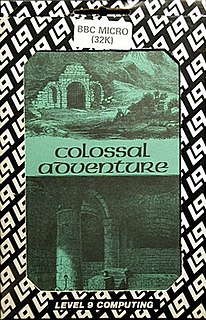
Colossal Adventure is a text based adventure game published by Level 9 Computing in 1983. It was originally released on the BBC Micro platform.
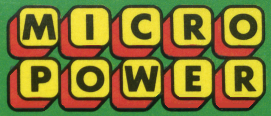
Micro Power was a British company established in the early 1980s by former accountant Bob Simpson. The company was best known as a video game publisher, originally under the name Program Power. It also sold many types of computer hardware and software through its Leeds 'showroom' or via mail order.
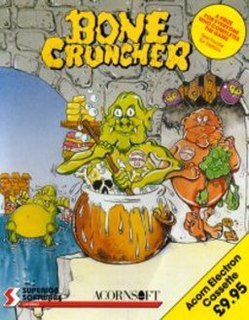
Bone Cruncher is a puzzle video game for the Acorn Electron, BBC Micro, and Commodore 64 first published by Superior Software in 1987. It uses the "rocks and diamonds" mechanics of Boulder Dash. An Amiga version was released in 1988.

Acornsoft's Starship Command is a multidirectional shooter released in 1983 for the BBC Micro and Acorn Electron. It was available on cassette as well as 5.25" disc for the BBC and ROM cartridge for the Acorn Electron Plus 1 expansion module. The game was written by Peter Irvin who, along with Jeremy Smith, went on to create the arcade adventure Exile.

Castle of Riddles is a text adventure released by Acornsoft for the BBC Micro and Acorn Electron (1984) home computers. The game was written by Peter Killworth and was one of a series of text adventures written for, or ported to the BBC Micro by the same author. As with all such games, only text is used. The player must use a simple 'verb-noun' format to control the game. Unlike Killworth's other Acornsoft adventures, Castle of Riddles was not updated and reissued by Topologika so became unavailable after 1985 when Acorn Computers pulled out of the games publishing market. Some of the puzzles however were included in the Topologika version of Philosopher's Quest.

Hunchback is a video game developed by Century Electronics and published in arcades in 1983. The game is loosely based on the 1831 Victor Hugo novel The Hunchback of Notre Dame and the player controls Quasimodo. Set on top of a castle wall, the player must guide the Hunchback from left to right while avoiding obstacles on a series of non-scrolling screens. The goal of each screen is to ring the church bell at the far right.
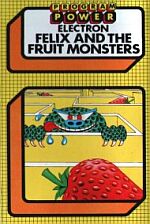
Felix and the Fruit Monsters is a video game written by John Chaytor and released by Micro Power for the BBC Micro and Acorn Electron in 1983. A sequel to platformer Felix in the Factory, it is a maze game resembling Pac-Man, but with different gameplay.

The British Broadcasting Corporation Microcomputer System, or BBC Micro, is a series of microcomputers and associated peripherals designed and built by Acorn Computers in the 1980s for the BBC Computer Literacy Project. Designed with an emphasis on education, it was notable for its ruggedness, expandability, and the quality of its operating system. An accompanying 1982 television series, The Computer Programme, featuring Chris Serle learning to use the machine, was broadcast on BBC2.

Football Manager is the first game in the Football Manager series.

Business Games is a collection of two business simulation games for the BBC Micro published in 1983 by Acornsoft. An Acorn Electron version followed in 1984. The included games are Stokmark and Telemark.

Acornsoft LISP is a dialect and commercial implementation of the Lisp programming language, released in the early 1980s for the 8-bit Acorn Atom, BBC Micro and Acorn Electron computers.

Stock Car is an overhead-view racing video game written by A. W. Halse and published in the UK by Micro Power. It was released in 1984 for the BBC Micro, Acorn Electron, and Commodore 64 computers. Although the cassette inlay gives the release date as 1984, some sources state the release date as 1983, and the game is also known as Stock Car Racer.

Frenzy is an 8-bit computer game published in the UK by Micro Power in 1984. It is a version of the arcade game Qix. The game was released for the Acorn Electron and BBC Micro in 1984 and for the Commodore 64 in 1985.

Deathstar is multidirectional shooter for the Acorn Electron and BBC Micro developed by Peter Johnson and originally published in the UK by Superior Software in 1985. It is a clone of the arcade game Sinistar.
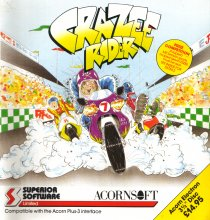
Crazee Rider is a motorbike racing video game created by Kevin Edwards and published by Superior Software in 1987. It was released for the Acorn Electron and BBC Micro with an enhanced version for the BBC Master. The game was particularly well received for the Electron as it was the first 3D racing game with corners for that machine.



















